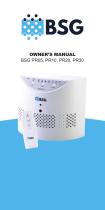Page is loading ...

1
Tools and materials
Installing the BSGX4e unit
For optional methods to install your BSG, see BSGX4e Business Gateway Installation Guide
Installation (NN47928-303).
Configuring the initial system settings
Configuring PPPoE service
Saving your configuration
10
Configure each LAN device to dynamically obtain an IP address and
DNS server addresses.
BSGX4e
BSGX4e
Quick Installation Guide
Before you install the Business Services Gateway
X4e, ensure that you have the following package
contents and materials:
Package Contents
● BSGX4e unit
● Regulatory sheet
● Quick Installation Guide (NN47928-303)
● Documentation CD
● BSGX4e universal power supply
Materials
● two or more standard Ethernet cables
● RJ-11 modular telephone cord
You can download all documents referenced in this Quick Installation Guide
at www.nortel.com
2
Position the BSGX4e on a desktop. Make sure you leave
enough space around the unit for rear access to the
cables.
3
Select the power supply attachment from those supplied in
your package contents to fit your AC power outlet and snap
it into the power supply adaptor.
For more details on how to configure your system, see BSGX4e Business
Services Gateway Configuration Guide (NN47928-102).
Note: The LED that corresponds to the LAN port you use only lights if
the device connected to that port is powered up.
4
Connect the power adapter to the 12V DC outlet on the rear of your
BSG, and connect the other end to an AC power source. Ensure that
the Power LED on the front of the BSG lights up.
11
Open a new browser window, type http://192.168.1.1 in the address
bar, and press Enter.
If you have PPPoE (DSL) service, complete the following steps.
N0155271
NN47928-305
Standard 01.02
June 2007
Caution: Risk of equipment damage. To avoid damaging the equip-
ment, use the BSGX4e with only the supplied BSG power supply.
7
Connect your Internet service to the WAN port on the back of your
BSG. Ensure that the corresponding WAN port LED on the front
panel lights up.
6
Repeat step 5 for up to three additional devices you want to connect
to your LAN.
5
Plug one end of a standard Ethernet cable into one of the four LAN
ports on the back of your BSG. Plug the other end of the Ethernet
cable into your PC or network device. Ensure that the corresponding
LAN port LED for the LAN port you used lights up.
24
Open another browser window to verify that you can connect to the
Internet.
23
Click Save Changes. Your configuration changes are saved.
22
From the list on the left, click NAT. Add a new NAT interface. Set the
interface to ppp0 and the status to On.
21
From the list on the left, click Policy. Add a new security policy. In
the From field, select eth1; in the To field select ppp0. Leave all
other default values as they are.
8
Contact your Internet service provider (ISP) to obtain your encapsu-
lation type (Ethernet, PPPoE) and account information (service
name, User ID, and password).
9
Contact your Voice over IP (VoIP) service provider to obtain the IP
address of the SIP server and domain name.
20
From the Configuration Area at the top of the Web UI, click Security.
19
From the list on the left, click PPP. Verify that the Link Status is Up.
18
From the list on the left, click IP. Click eth0, and modify the configu-
ration to set DHCP to Off.
17
In the Active field, select Yes. Enter your ISP account information
(ServiceName, Username, and Password).
16
From the list on the left, click PPP. Click New and create a new
profile.
15
From the Configuration Area at the top of the Web UI, click Data.
14
If you do not have PPPoE, go to step 23. If you have PPPoE, go to
step 15.
13
Click User Accounts in the left-hand menu. Click nnadmin, and
change the password.
Copyright © Nortel Networks Limited 2007. All Rights Reserved
LAN portsWAN port 12V DC Outlet
Power LED
LAN port LEDs
WAN port LED
12
In the logon window, enter the default user name (nnadmin) and the
default password (PlsChgMe!) to log onto your BSG.
/




